CSW’s Summit in Bangalore on September 10 was the first Crowdsourcing Week event held in India, co-hosted by the Digital Empowerment Foundation.
The day’s presentations will be available soon and we will update this article with a link. In the meantime what follows is a brief recap on some of the event’s highlights and key points.
Crowdsourcing Week’s Founder and CEO, Epi Ludvik Nekaj, started the day’s events with an opening address that took the audience through the journey of crowdsourcing and the global impact it is currently making. While emphasizing the fact that crowdsourcing is a mindset and something that can only be achieved by working together, Epi pointed out the importance and value of social currency.
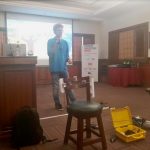 Garrett Kinsman pointed out the issue of citizens being deprived of Internet access, especially in Indian rural areas. This is a problem he is trying to solve through the Natana project, which seeks to provide sustainable last mile internet connections that are super easy to maintain and deploy. Community driven networks, such as FireChat which was used during the Hong Kong protests, allow individuals to resell their own Internet. According to current regulations, however, this is illegal – a subject that was raised during Garrett’s talk and was brought up later during one of the panel sessions.
Garrett Kinsman pointed out the issue of citizens being deprived of Internet access, especially in Indian rural areas. This is a problem he is trying to solve through the Natana project, which seeks to provide sustainable last mile internet connections that are super easy to maintain and deploy. Community driven networks, such as FireChat which was used during the Hong Kong protests, allow individuals to resell their own Internet. According to current regulations, however, this is illegal – a subject that was raised during Garrett’s talk and was brought up later during one of the panel sessions.
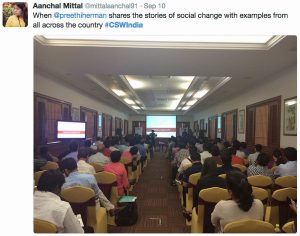 Preethi Herman, Campaign Director at Change.org, which is the largest technology platform for social change, explained how petitions and combined efforts of the crowd, both online and offline, can make a real difference when trying to create meaningful change. The stories on and the real-life examples from Change.org show that the creativity and efforts of one person become so much more powerful when combined with those of others.
Preethi Herman, Campaign Director at Change.org, which is the largest technology platform for social change, explained how petitions and combined efforts of the crowd, both online and offline, can make a real difference when trying to create meaningful change. The stories on and the real-life examples from Change.org show that the creativity and efforts of one person become so much more powerful when combined with those of others.
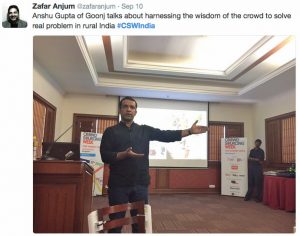 The lack of awareness of so called “non-issues” was the topic raised by Anshu Gupta (right), Founder of Goonj, in a popular session that was later referred to several times during the conference. His main point was that the problems that are dealt with are those that the crowd decides need to be talked about. However, according to Anshu, you can only make a real, lasting impact by addressing the non-issues as well.
The lack of awareness of so called “non-issues” was the topic raised by Anshu Gupta (right), Founder of Goonj, in a popular session that was later referred to several times during the conference. His main point was that the problems that are dealt with are those that the crowd decides need to be talked about. However, according to Anshu, you can only make a real, lasting impact by addressing the non-issues as well.
The first panel session of the day (main image) addressed this last subject in greater depth. SafeCity and Rang De are such platforms that dared to address non-issues and sat together with communities to solve these problems. Key learnings from this session were the need to work together to create trust and transparency in order to achieve social development through crowdsourcing.
After the panel session, the topic of discussion was Crowdfunding.
Fuel-a-Dream, founded by Ranganath Thota, supports and helps to fund innovative projects that serve a social cause. This raised the point of India’s crowdsourcing world being very much focused on philanthropic projects only. Fuel-a-Dream places high importance on what you will achieve with your product or project and what impact it will have on communities who are directly or indirectly involved.
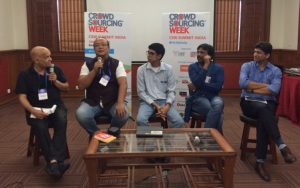 During the second panel session, Ranganath was asked to explain this further. He believes India is not yet on the same level as the West, where innovation for the sake of innovation is much more appreciated and encouraged. India is still very much in a place where social development is urgently needed. Besides, what works in the West does not necessarily work in the East.
During the second panel session, Ranganath was asked to explain this further. He believes India is not yet on the same level as the West, where innovation for the sake of innovation is much more appreciated and encouraged. India is still very much in a place where social development is urgently needed. Besides, what works in the West does not necessarily work in the East.
Next up, Naveen Lakkur, Director of the Founder Institute, addressed the fact that there is not enough support nor investment into innovative projects. That is where the crowd comes in, again pointing to the power of crowdfunding to make ideas come to life. Nevertheless, the lack of awareness in India about crowdfunding is significant. Once more people know about the concept of crowdfunding, he expects that a rise in the number of innovative projects, both philanthropic and otherwise, will take place.
As a last order of the day, Epi Ludvik Nekaj hosted a COLAB interactive session. The entire audience participated in the session when they were asked to form groups based on their month of birth. The groups were then asked to form a venture of their choice. This exercise, based on the Birthday Paradox, helped create new synergies among the attendees. They were able to connect with people they might otherwise not have spoken to, and in the form of a fun yet task-oriented activity. There was also one shared birthday in the room.
Osama Manzar, Founder and Director of the Digital Empowerment Foundation, co-hosted this first CSW Summit in India. His closing remarks included encouraging each other to help one another achieve their goals. “By sharing ideas, knowledge, skills and even technologies, crowdsourcing can create a lot more change in India.”
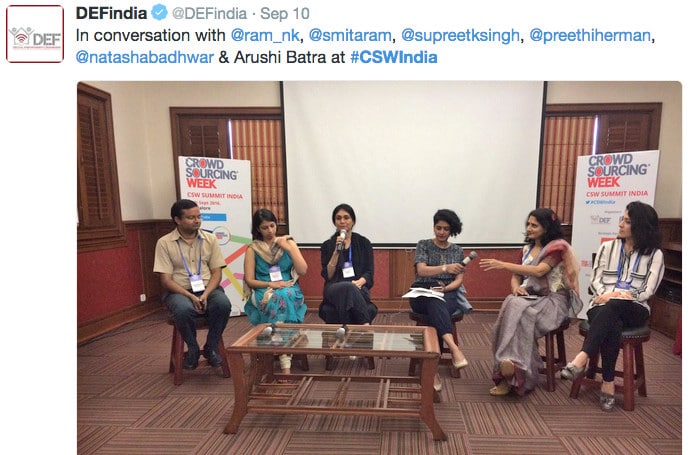
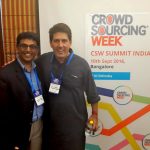
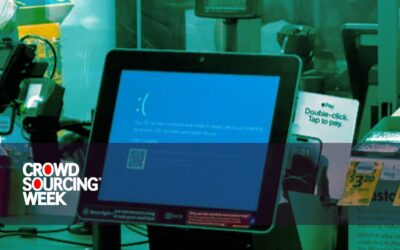

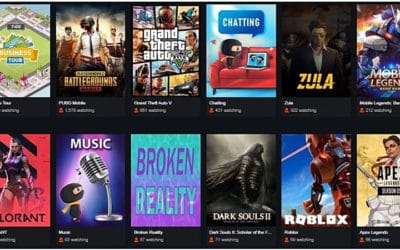
Good to see the updates, do we have a site/page reflecting various crowdsourcing
activities – organizations in India. When is next crowdsourcing week event in India ?